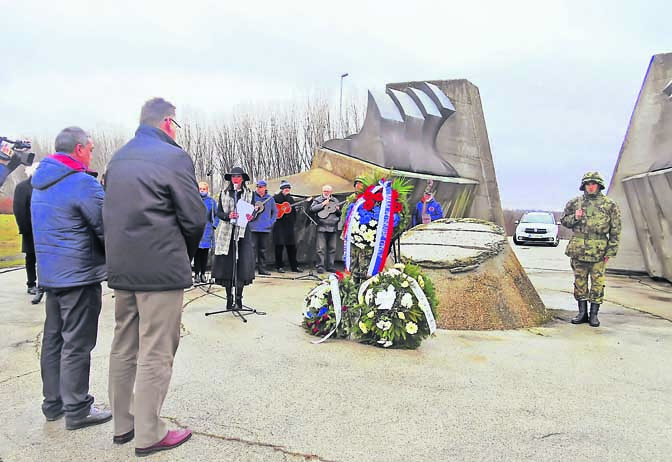16.12.2017.
Romny Victims Never to Be Forgotten
A memorial service, dedicated to preserving the memory of shot and liquidated Romany people in the Second World War was held with the highest state honours at execution site near Jabuka. By lying wreaths and white roses at the monument “Brazde”, the homage to the victims was paid by the Mayor of Pančevo, representatives of the Government of the Republic of Serbia, delegation of the Serbian Armed Forces, National Council of Romany National Minority, military diplomatic corps, descendants of the victims and the citizens along with appropriate artistic programme which marked the International Remembrance Day of Romany Population Killed in the Second World War.
“Brazde” monument, as part of the memorial complex at the site of the mass grave of around 12,000 civilians – Serbs, Romanies and Jews, cautions and reminds of 16th December 1942, when Heinrich Himmler ordered systematic sending of Romany population to concentration camps in order to be liquidated. The order of January the following year required that the Romany people were to be deported to the death camp “Auschwitz- Birkenau” in Poland and that deportation of Romanies lasted over entire 1943 until the half of 1944, and as a result of the organised pogrom, a sub-camp “Zigeunerlager” was established within the death camp “Auschwitz- Birkenau” only for the Romanies from the territory of Germany and the occupied states and it was functional until 2nd August.
 During the said period, more than 23,000 Romanies were imprisoned in the “Zigeunerlager” out of whom 20,000 were liquidated in the period during which this sub-camp was headed by the infamous doctor Joseph Mengele who was conducting organised experiments on Romanies, and Romany children in particular.
During the said period, more than 23,000 Romanies were imprisoned in the “Zigeunerlager” out of whom 20,000 were liquidated in the period during which this sub-camp was headed by the infamous doctor Joseph Mengele who was conducting organised experiments on Romanies, and Romany children in particular.The patrons of the commemorative ceremony in the memorial complex “Stratište“ is a Board of the Government of the Republic of Serbia for cherishing traditions of liberation wars of Serbia in collaboration with the town of Pančevo.
“Our task, as a part of modern and civilised Europe, is never to allow the genocide of the fascists, their crimes and massacres to fall into the oblivion. That is why we are here today. Serbia respects its victims. We remember every lost life, we do not forget killed Romanies, Serbs, Jews, Polish, Slovakians, and all innocent civilians and soldiers who were robbed of a right to life just because they belonged to certain nation, ethnic, religious or race group” Negovan Stanković, State Secretary of the Ministry of Labour, Employment, Veteran and Social Affairs said stressing that Serbia was proud of Romany identity, whose essence was reflected in freedom, goodness, peace-loving, and he also stated that he desired bettering their economic situation, social conditions and status in the society.
On behalf of the National Council of Romany National Minority, the gathered at the commemorative event were addressed by Jelena Jovanović, who stressed that it was a day that marked the remembrance of the victims killed at one of the largest execution sites in Europe and it marked a day of admonition for 12,000 lives taken too soon and without mercy from women, children and the elderly just because they were Serbs, Jews or Romanies.
“We sincerely feel sorrow for all the suffering whereat the violent death is the most terrible. In Jabuka, 2,200 people died from “Topovske šupe” and from “Banjica”, “Sajmište”, “Svilara”, Gestapo prisons, which cruelly remind us that there is no good war, nor bad peace. This is a history classroom, and it is up to us to learn, never to forget because it is the only way for us to protect the generations to come and prevent atrocities from repeating, anywhere in the world” – these were the words of Jovanović.
The genocide of Romanies in the Second World War represents one of the most tragic episodes of that armed conflict, which resulted in suffering and liquidation of half a million Romanies who had come from several European states – the genocide that the modern generations have almost completely forgotten.

